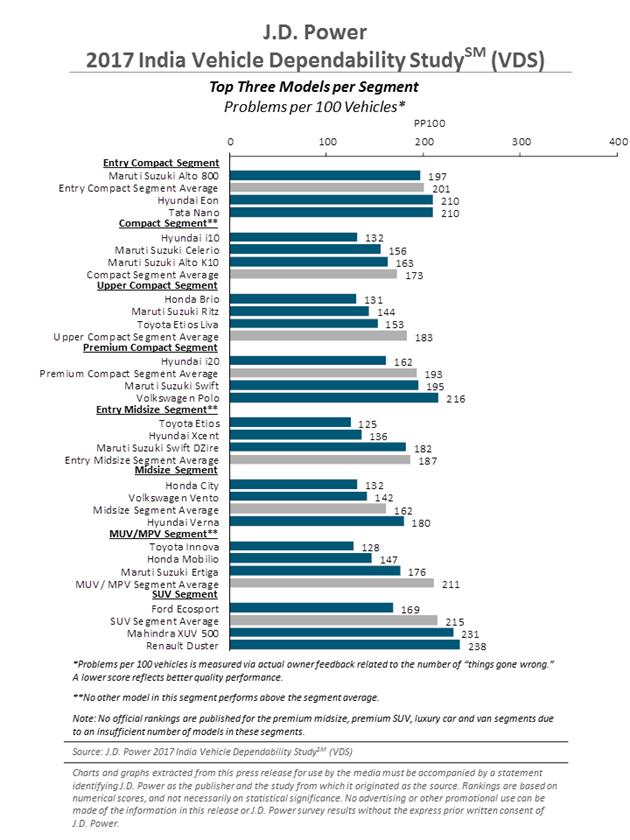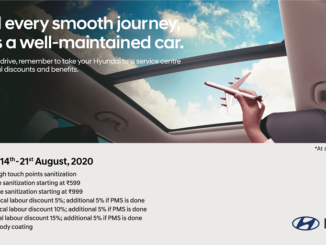Honda, Hyundai and Toyota Each Receive Two Model-Level Awards
SINGAPORE: 29 June 2017 — Longer-term vehicle dependability in India has declined marginally year over year, as 56% of new-vehicle owners indicate experiencing at least one problem with their vehicle, according to the J.D. Power 2017 India Vehicle Dependability Study,SM (VDS) released today. Last year, 53% of new-vehicle owners experienced at least one problem.
Overall vehicle dependability in India averages 189 problems per 100 vehicles (PP100) in 2017, deteriorating from 185 PP100 in 2016. A lower number of problems reflects higher longer-term vehicle quality. Owner-reported problems increase sharply after vehicles are driven more than 40,000 kilometers (kms). Owners of vehicles that have been driven for more than 40,000 kms indicate an average of 73 more problems per 100 vehicles than those owners whose vehicles have been driven fewer than 40,000 kms. Vehicle exterior and driving experience account for more problems than other categories and, within these two categories, problems relating to uneven tire wear, noise from doors, bumper and exterior corrosion are more prevalent in vehicles that have been driven more than 40,000 kms.
“In addition to usage, varying road and weather conditions affect the longer-term dependability of vehicles in India,” said Shantanu Nandi Majumdar, director at J.D. Power. “After about three years of ownership, problems related to squeaks and rattles are typically reported which is likely to impact overall build quality perceptions. Automakers that are able to identify such problems related to extended use—and resolve them at the manufacturing stage—are likely to be able to provide a more positive ownership experience for their customers.”
The study also finds that diesel-fueled vehicles deteriorate more after 40,000 kms vs. petrol-fueled vehicles. During the past four years, the gap in reported problems between vehicles driven more than 40,000 kms and those driven fewer than 40,000 kms is greater for diesel vehicles than for petrol vehicles. Plus, a larger proportion of owners of diesel vehicles driven more than 40,000 kms indicate the need to replace parts/ components in their vehicle (67%) vs. petrol vehicle owners (58%).
Following are additional findings of the 2017 study:
Unexpected repairs influence dependability: The incidence of repairs for unexpected problems in 2017 is 22%, the lowest level since 2013. Owners who say they had to take their vehicle in for unexpected repairs report more problems (366 PP100) compared to owners who say they haven’t had any unexpected repairs (138 PP100).
More owners opt for extended warranty: More vehicle owners are purchasing an extended warranty. In 2017, 38% of all owners say they have an extended warranty, up from 27% last year. More first-time vehicle buyers (44%) purchase an extended warranty than do repeat owners (31%).
Longer-term vehicle dependability builds advocacy and loyalty: Among owners who indicate they have not experienced a problem, 74% say they “definitely would” recommend their current model to others and 53% say they “definitely would” repurchase their current make. In contrast, advocacy declines to 56% among owners who experience at least one problem with their vehicle while loyalty drops to 39%.
Study Rankings
The study includes 74 models in 12 vehicle segments: multi-utility/ multi-purpose vehicle (MUV/ MPV); sport-utility vehicle (SUV); premium SUV; van; entry compact; compact; upper compact; premium compact; entry midsize; midsize; premium midsize; and luxury.
Hyundai receives two model-level awards. Hyundai i10 (132 PP100) ranks highest in the compact segment while Hyundai i20 (162 PP100) ranks highest in the premium compact segment.
Honda receives two model-level awards. Honda Brio (131 PP100) and Honda City (132 PP100) rank highest in the upper compact and midsize segments, respectively.
Toyota receives two model-level awards. Toyota Etios (125 PP100) and Toyota Innova (128 PP100) rank highest in the entry midsize and MUV/ MPV segments, respectively.
The Maruti Suzuki Alto 800 (197 PP100) ranks highest in the entry compact segment and the Ford Ecosport (169 PP100) ranks highest in the SUV segment.
About the Study
The J.D. Power India Vehicle Dependability Study (VDS), now in its 10th year, measures problems experienced by original owners of 30- to 42-month-old vehicles for 169 different problem symptoms across nine vehicle categories: vehicle exterior; driving experience; features, controls and displays (FCD); audio and entertainment; seats; heating, ventilation and air conditioning (HVAC); vehicle interior; engine; and transmission. Overall dependability is based on the number of problems reported per 100 vehicles (PP100), with a lower score reflecting higher longer-term vehicle quality.
The study is based on evaluations from 8,741 original owners who purchased a new vehicle between July 2013 and September 2014. The study includes 74 models covering 17 brands, and was fielded from January through April 2017 in 40 cities.
About J.D. Power in the Asia Pacific Region
J.D. Power has offices in Tokyo, Singapore, Beijing, Shanghai, Malaysia and Bangkok that conduct customer satisfaction research and provide consulting services in the automotive, information technology and finance industries. Together, the five offices bring the language of customer satisfaction to consumers and businesses in Australia, China, India, Indonesia, Japan, Malaysia, Philippines, Taiwan, Thailand and Vietnam. J.D. Power is a portfolio company of XIO Group, a global alternative investments firm headquartered in London, and is led by its four founders: Athene Li, Joseph Pacini, Murphy Qiao and Carsten Geyer. Information regarding J.D. Power and its products can be accessed through the Internet at india.jdpower.com.




